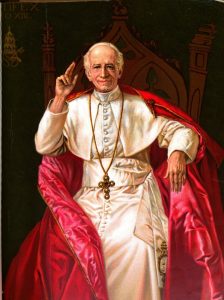An e-mail I received today with a very important and pertinent question. It involves the inerrancy of Scripture. In short, this means that the Scriptures do not contain errors. I decided to answer the e-mail and share my response.

-
Save
The Catechism defines Inerrancy as “The attribute of the books of Scripture whereby they faithfully and without error teach that truth which God, for the sake of our salvation, wished to have confided through the Sacred Scriptures.”
Many see in this Catechism statement a compromise of traditional teaching. Some read this to mean that only things pertaining to our salvation are without error, but it is not inerrant where it touches on science, history or other tangible matters. In other words, the Bible is only inerrant on matters of faith and morals.
The e-mail went like this,
“[In debates I’ve had school] I maintained that Dei Verbum and the Church hold to Inerrancy, not limited inerrancy as a couple of theologian types have tried to argue me into.
I thought you would have up-to-date material that would at least show my view is DEFENSIBLE. What do you recommend? I’ve read the Scott Hahn materials, Pope Benedict’s Jesus of Nazareth (which one theologian thought would move me to limited inerrancy), etc.
Thanks, RB
I gave a short response and pointed RB to a very thorough and orthodox paper on inerrancy with argues for the full position taken by the Church without wavering until theologians challenged it in modern times.
I wrote,

-
Save
I believe in the plenary inerrancy of scripture. I do not believe that Dei Verbum in any way weakens traditional and historic teaching of the Church. To do so would contradict the constant teaching of the Church and rationality.
I could write a whole treatise for you on this but I could not do better than this one I’m sharing with you entitled The Inerrancy of Scripture and the Second Vatican Council. written by Mark Joseph Zia in CatholicCulture.org. It is a good read and should clear up any doubts or confusion.



This Post Has 3 Comments
Having just watched your wonderful presentation on Peter and Popes, I am left with one problem. It seems to me that the current Pope is the one who is "compromising on the full teaching of the Church." He has done so in a variety of statements. He has lauded the value of commitment he sees in some homosexual relationships. He has evidently said something like, "a little bread and wine would not hurt" (regarding an illicitly married person receiving the blessed Sacrament. And he has said what he has said about the death penalty, an atheist dad being in heaven, etc., etc..
How, then, am I supposed to see in him an infallible teacher? I know that none of these were officially given "ex cathedra," and not all in a formal way. Still, in all of these statements Francis is, in fact, teaching concepts which are bound closely to theological issues (sacramental, anthropological, soteriological, eschatological, world view). So, how has he been a teacher that reflects the Petrine teaching authority, when he consistently runs contrary to the historic teaching of the Church?
From infallible scripture:
No man hath seen God at any time. —John 1:18
For I have seen God face to face. —Genesis 32:30
Oops!
STEVE RAY HERE: There is no oops there. This is written by someone who seems not to have ready carefully or thought deeply on these matters and who tries to find a boogie man under the bed when there is not one there to find. Here for example is one of a many explanations:
Now this case is very much like this illustration. God in His eternal essence is invisible (“unseeable,” 1 Timothy 1:17). No man has seen Him, nor can we see Him (1 Timothy 6:16). He is spirit, not form (John 4:23–24). John tells us in the passage before us a profound and wondrous truth: “No man hath seen God at any time. The only begotten Son which is in the bosom of the Father, he hath declared him.” That is, this invisible (unseeable) God is unfolded to us, interpreted to us (the word here translated “declared” is the word from which our word “exegesis” is derived), in the words and in the person of Jesus Himself. So fully is He declared, not only in the words of Jesus but in His person, that Jesus could say, “He that hath seen me hath seen the Father” (John 14:9).
But this essentially invisible God has been pleased in His great grace to manifest Himself again and again in bodily form as with Jacob in Genesis 32). Moses and the seventy elders saw such a manifestation of God (or a theophany) when they were in the mount. Isaiah saw such a manifestation in the temple (Isaiah 6:1), and in describing it he properly declared, “I saw the LORD.” Job saw such a manifestation and was so humbled by the actual coming face to face with God Himself that he cried, “I abhor myself, and repent in dust and ashes” (Job 42:6). It was God that was manifested in these theophanies, so it was God they saw.
We see then that both of these apparently flatly contradictory statements: “No man hath seen God at any time” and “Moses [and the others] saw God” are perfectly true.
Hi Steve- Love what you do, I have learned so much from you.
"Call no man Father" would seem to me a bit of an issue for those who believe Catholics are wrong- blasphemous even- to call our priest by Father so-and-so. I get the apologetics of calling a Priest Fr., and no one I have ever known referred to a Priest or Bishop as "God the Father"- and didn't confused their title with the Lord's prayer opening.
But if someone chose to "die on that hill" of accusing Catholic "blasphemy" – wouldn't other references or usages of the word Father in the N.T. contradict Matthew's Gospel ?
To me it would seem it would have to, regardless how much spinning or contorting parsing out each contrary verse that mentioned Father would take. There are some very adamant proponents of "call no man(or priest) Father" – when it right there in black and white. Inerrancy? or not?
STEVE RAY HERE: Don, the words for father referring to God or referring to a man are the same. One must understand that when Jesus spoke he was using rabbinic hyperbole which is a form of exaggeration to make a point. Hyperbole was also used when he said to pluck out your eye which no protestant take seriously.
He also said to call no man teacher or rabbi and obviously everyone does that, protestants and Catholics like. If we were to follow his rules strictly, and call no man your father, then what do I call the man who is married to my mother who gave me birth?
There are no contradictions in this case at all either within the Bible nor between the Bible and the Catholic faith. Jesus called Abraham father, Stephen called the leaders of Israel father, and Paul called himself Timothy‘s father.
There is no problem with this unless the protestants want to ignore the context and the hyperbole and the whole purpose of Jesus.
Comments are closed.